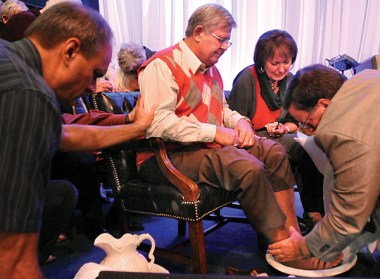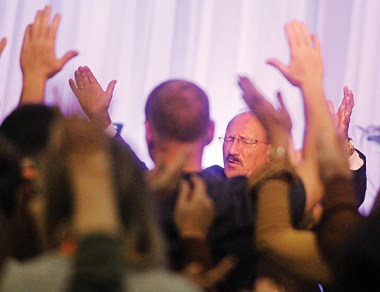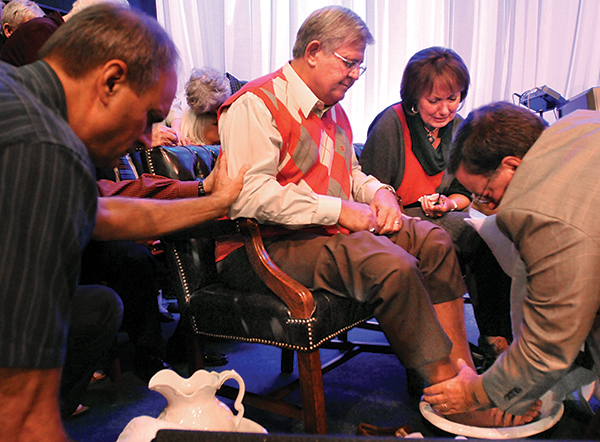Roving journalist Charles Kuralt once called Madison, Indiana, "the most beautiful river town in America." It's a little place—just 13,000 people—across the Ohio River from Kentucky. If you walked along the riverfront, you'd see quaint shops, a marina for passing boaters, and established trees lining the street.
For decades though, the beauty masked an ugly truth. Madison First Assembly of God, one of the town's key congregations, was rife with toxic church politics that hurt and expelled minister after minister. Four successive pastors had come and painfully left the congregation. The church earned a reputation—in their town and denomination—for backstabbing and hypocrisy.
That's hardly news. But unlike many similar stories, there's more to this church's tale.
"We smiled a lot, but it all masked decades of dysfunction."
I first heard of Madison First Assembly after the town's local paper reported on an unusual church service: a reconciliation event in October of 2012. The church called its former ministers back to Madison to ask their forgiveness for how they were treated. The church paid their way, publicized the service, invited the community. The church was open about wrongs done, and serious about setting them right.
One photo from the paper shows Peter Joudry, the current pastor, bent washing the feet of former ministers on behalf of the congregation. An unusual image for an unusual news item, and one that pricked my curiosity. How did the little church go from being a serial "widowmaker" to literally washing the feet of abused former pastors?
 Madison Assembly of God Pastor Peter Joudry, far right, and his wife Ruth, wash the feet of former pastor Don Fisher and his wife Barb Fisher while the Fishers were prayed over by Byron Nagle, far left, and others during a repentance ceremony at the church this weekend. The feet of former pastors Steve Perry, Chuck Lynch, Ronald Bontrager, as well as the pastor's wives were also washed. the foot washing ceremony, according to Pastor Joudry, was done as a symbol of the church's humble and sincere apology for the way each of the pastors and their families were mistreated while they served the church. (Staff photo by Ken Ritchie)
Madison Assembly of God Pastor Peter Joudry, far right, and his wife Ruth, wash the feet of former pastor Don Fisher and his wife Barb Fisher while the Fishers were prayed over by Byron Nagle, far left, and others during a repentance ceremony at the church this weekend. The feet of former pastors Steve Perry, Chuck Lynch, Ronald Bontrager, as well as the pastor's wives were also washed. the foot washing ceremony, according to Pastor Joudry, was done as a symbol of the church's humble and sincere apology for the way each of the pastors and their families were mistreated while they served the church. (Staff photo by Ken Ritchie)Decades of dysfunction
On the phone, Joudry was genial and quick to chuckle. He told the backstory of the service.
"To Sunday morning visitors, we looked like the healthiest church in town. The worship was red hot and the preaching was strong. We smiled a lot. But it all masked decades of dysfunction.
"The roots of the problem went all the way back to the beginning of our church in the 1950s. From the start, there were factions within the congregation. A few influential people in the church—big tithers, and people with big opinions—became increasingly important. Eventually, it was literally their way or the highway for pastors. Their divisive nature patterned the DNA of the church, and no one dealt with it. It festered, and grew, until eventually, it seemed normal."
Pastor after pastor was chewed up and spit out by a growing pattern of hostility.
While turnover can be common in small-town churches, and is never easy, over the decades a pattern established itself. Over the years, minister after minister was faced with a church that welcomed them with a smile, then slowly soured, turned on them, and drove them out of the church on one pretext or another. The issues were minor, but the political power of an elite few in the church was not. While Joudry speaks in generalities about what happened long before he came to pastor there, the church's reputation as a pastor-killer was attested to by the town, the denomination, and by his own experience.
"Every church has conflict and differences of opinion. I understand that," Joudry said. "It can be a healthy, cleansing thing. But this was not that kind of conflict. Where it should have been open, this was covert. Where it should have been discussed, this was hidden."
Its secret nature made it nearly impossible to call out. And as pastor after pastor was chewed up and spit out by a growing pattern of hostility, the church began to have a reputation in the community as a "widowmaker" for ministers.
"This systemic problem became the corporate identity of the church." Joudry told The Madison Courier, in an article the community paper published on the service. "The reputation was national, and the reputation was bad."
You're the pastor … as long as we like you
On the phone, I asked him to tell me more.
"Key lay leaders saw pastors as just chaplains for the church, not leaders. In their view, a pastor was supposed to preach, to supervise worship, to marry and bury. Ultimately, he was just an employee, and his value was tied to their satisfaction with his services. His performance had to meet their stringent personal requirements for style and comfort. Step out of line, by going against the grain, or by taking true directional leadership of the congregation, and you'd be warned. Step out again, and you'd be gone.
"Really, there were always two congregations: one led by the pastor, and one led by a quiet lay competitor who was uninterested in the title but obsessed with things going his way. He was well intentioned, I'm sure, but power hungry, angry, and dangerous if crossed. And it was his way or the highway. For decades."
Every church experiences conflict. It's a natural part of worshiping in a community with other people. "But it is one thing to have shallow conflict and deep unity," said Joudry. "It's another to have shallow unity—surface pleasantness most of the time—and deep conflict. Our brokenness was at our most basic levels of organization."
Pastors were not merely replaced, they were driven out, he said, and for "offenses" that were far from deserving of such treatment. Sermons that were too short. Or too long. Or small misbehaviors from the pastor's children. Criticism would start with small, passive-aggressive digs, then bloom cruelly. It impacted not just the ministers, but their entire families.
"One pastor's wife, like me, was a little rotund rather than the petite, thin pastor's wife that these people thought she should be," Joudry said. "They would invite him places but conspicuously leave her out or ignore her because of her appearance. At Christmastime they backhandedly gave her a membership to a gym—a 'gift' that was a cruel jab at her struggle with her weight. When I first came, I didn't believe that passive-aggressive horror stories like this really happened. But they did. Ministry qualification was all about image."
Joudry says that one of his predecessors' children had been so hurt at the church that the teenager considered suicide at a cliff in the state park across the street. During the reconciliation weekend, "that family stood on the cliff where the suicide would have happened. They dealt with the hurt."
During the service, the Joudrys washed the feet of one pastor's children. "We pulled off their tennis shoes, and said, 'We're sorry. We're sorry for the things that were done to your parents. We're sorry for the things that were said to you.' After they returned from the service, they wrote to me to tell me the story: 'Now we can think about this city without thinking about the horrors of what it did to us.'"
Joudry, from the colorful Pentecostal tradition, talks about an "Absalom spirit" in the congregation. Like David's usurping son, the key members supported the pastor verbally while "plotting treason" at the gates. The church's unity was broken. And it didn't stop at the walls of the church. As pastor after pastor left painfully, the reputation of the church soured in the community.
He's quick to advocate for churches to hold their leaders to high standards of accountability. But the depth and strangeness of this manipulation was toxic. Something had to give.
And something did. The church split.
 Former pastor Steve Perry and the congregation lift their hands in prayer on Friday during the Madison Assembly of God Reconciliation weekend. (Staff photo by Ken Ritchie)
Former pastor Steve Perry and the congregation lift their hands in prayer on Friday during the Madison Assembly of God Reconciliation weekend. (Staff photo by Ken Ritchie)Costly division
Prompted by what (under normal circumstances) should have been a minor run-in with a staff member, the church split. It was ugly, with the crisis coming at a meeting characterized by shouting and accusation. The congregation cracked along the lines of those influential members who had been at the center of the church's disunity for years.
"The level of their toxicity meant that as soon as they were opposed, it was them leaving or the pastor. Until I stood up to them, it had always been the pastor who'd left," Joudry said.
He's not sure exactly why he stayed when others had left, but suspects that it was because he had the unified support of the other ministry leaders, and an emphasis from the first on discussing and improving the church's culture and DNA. When the faction saw that they couldn't divide the board (leading to the pastor's dismissal) as in the past, they left. But even though Joudry was still there when the smoke cleared, he's not untouched.
"We are still dealing with the fallout." There's pain in his voice. "The split hurt in every way possible. We lost a third of our congregation, maybe more. It broke relationships. It hit us financially. In our small town, the half that left built a bigger, better building just up the road. It is a constant, public reminder of the pain."
He said that the church split has been like the death of a close family member. Ministries have suffered from fewer volunteers and resources. The congregation has struggled with various combinations of sorrow, ambivalence, and celebration.
"A year and a half later, it's still messy," he said. "I've lost friends. One wife in our church still comes, but her husband left. Some people are rejoicing that a group that bullied them for 30 years is gone. Others are deeply hurt, grieving, and heartbroken."
The split by no means fixed things. Members who left actively tried to persuade others to come with them. Years of dysfunction meant that even those who stayed needed to relearn what it meant to be a church family. They weren't used to the healthy give and take of life together.
The split took a personal toll, too. For weeks afterward, Joudry's post-sermon Sunday routine included weeping in the foyer. He's largely stopped his personal habit of traveling to do missions work (he's been to 50 countries), and when we spoke, hadn't been on a plane since the split. He struggles with anxiety, an issue that he didn't have before the recent stress. Leading his church toward health and restoration has come at a cost.
Even newer members of the church identified with the sins of the past to repent, pray for reconciliation, and start anew.
"I'm fundamentally a different person than I was two years ago. Before I came here, I traveled regularly to speak in churches. Not anymore. I had heart-attack-like symptoms from the stress of it all. I was exercising every day. Doing all of that stuff, and yet I had heart-attack-like symptoms. I've had real health issues that seem to be linked more to the mental and emotional strain of it than anything else. I don't go out to eat anymore. I rarely go anywhere. For stretches of weeks and months, my nine-mile commute is all the traveling that I can handle."
He paused. "Over and over again, we have had to work through the fact that we couldn't be the church that had existed there for the past 60-plus years. We had to cast a new vision—that we could become one body. That we all could submit ourselves to godly leaders in our church and denomination."
At least two of Madison First Assembly's former pastors have gone on to successful ministries elsewhere, leading 1500-plus person congregations. If size matters, they've stepped "up" from the small congregation along the Ohio River. But they were eager to return, to reconcile with the church, to gain a sense of closure from a strange, shared chapter in each of their lives.
A message and a model
In a press release titled "An Open Message to Our Community," Joudry spoke on behalf of the church:
"We recognize that in the past we have not always been in Christian unity …. We have not always treated our brothers and sisters in Christ with respect and love …. We have not been a Godly witness to the power of the gospel of Christ because of our disobedience to God's word.
"We are resolved to put these patterns of behavior behind us, and become the unified body of believers that Christ anticipated when he prayed in John 17:23 ' … that they may be brought to complete unity. Then the world will know that you sent me.'"
"I hope this can be a model for others," Joudry said to me on the phone. "Each church has its story, has its 'stuff.' Our job is to face it. Face our junk. Face that elephant in the sanctuary that nobody talks about. Face it, stare it down, cry over it. Work through it. And when it's been wrestled to the ground, to get up and begin to look forward.
"It's dumb to act like we have no problems. And it's just as bad to take half measures. You can't fix congestive heart failure with band-aids. You have to dig down, dig right to the cause, look at ourselves."
Facing the problem has been messy and painful, and still is. Conflict always comes with aftershocks, with sad "what-if"s, with a sense of lost time, lost love, lost opportunities. But in the water and tears of an odd church service last year, many wounds were washed as one congregation faced their stuff and saw light on the other side.
A church repented for old sins. Reconciliation began. Something beautiful happened by the river in Madison.
Paul Pastor is associate editor of Leadership Journal.
Copyright © 2014 by the author or Christianity Today/Leadership Journal. Click here for reprint information on Leadership Journal.












